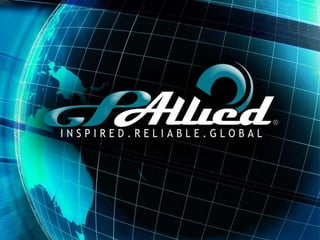
Introduction to Reliability Centered Lubrication
- 2. Field Lubricant Analysis Category I Ref: ISO 18436-4:2008 Condition monitoring and diagnostics of machines – Requirements for qualification and assessment of personnel – Part 4: Field lubricant analysis.
- 3. Why Lubrication Training or Certification? There is nothing more dangerous to equipment reliability than an untrained lube tech or a poorly designed lube program. With the average plant losing approximately 10% of the entire maintenance budget simply due to poor lubrication practices, it is vital that our in house practices become optimized. This starts with training and certification. Gone are the days of simply passing down information from generation to generation. It has been shown that the best performing organizations do so by performing their tasks in a well documented and proven manner. In industry, this begins with lubrication. While lubrication and contamination issues make up the vast majority of component failure, it reasons to be true that we must start with training. By following the ICML and ISO 18436-4:2008 Body of Knowledge, Allied Reliability & GPAllied have developed an exciting and information packed training course designed to get your internal programs pointed in the right direction!
- 4. Learning Objectives To enable you to perform correct Field Lubricant Analysis and Machinery Lubrication in accordance with established Best Practices, including: Manage lubricant delivery, storage and dispensation. Manage a route for machinery re-lubrication and/or inspection. Properly change and/or top the oil in mechanical equipment found in common industrial sites. Use simple techniques to select lubricants with the proper base oil and additive system for machinery commonly found in industrial settings. Use simple techniques to select grease lubricants appropriate for machines commonly found in industrial settings. Use simple techniques to select grease application methods (including automated delivery) that are least intrusive and most effective for machines commonly found in industrial settings. Use simple techniques to estimate re-grease volume and interval for machines commonly operated in industrial settings. Properly maintain automatic lubrication systems (auto-grease, mist systems, etc.). Employ basic oil analysis techniques to identify and troubleshoot abnormal lubricant degradation conditions, and use simple techniques to adjust the lubricant specification accordingly. Ref: ICML
- 5. Field Lubricant Analysis Training – Category I Contents Why Machines Fail Maintenance Strategies Lubrication Theory/Fundamentals Lubricant Selection Lubricant Application Lube Storage and Management Lube Condition Control Oil Sampling Lubricant health monitoring Wear Debris Monitoring and Analysis
- 6. International Council for Machinery Lubrication (ICML) Certification training available through the International Council for Machinery Lubrication. The International Council for Machinery Lubrication (ICML) is a vendor-neutral, not-for-profit organization founded to facilitate growth and development of machine lubrication as a technical field of endeavor. Among its various activities, ICML offers skill certification testing for individuals in the fields of machine condition monitoring, lubrication and oil analysis. ICML is an independently chartered organization consisting of both paid professional staff members and volunteer advisors.
- 7. ICML Certifications- Once Class, Two Options The Field Lubricant Analysis class is consistent with the Bodies of Knowledge for both of the following ICML certifications: Machinery Lubricant Analyst (MLA) Level I Machinery Lubricant Technician (MLT) Level I The MLT level certification training requires 16 hours of lubrication related training with a specific body of knowledge. The MLA level certification contains the same 16 hour body of knowledge as the MLT with an additional 8 hours of basic oil analysis introduction. Allied and GPAllied have chosen to offer a single course that is consistent with the MLA requirements yet allowing the attendee company to choose with certification is consistent with the plant or corporate reliability program objectives.
- 8. About Your Trainer Matt Spurlock serves as the Director of Lubrication Services for Allied Reliability. Matt joined Allied in January 2009 as a Subject Matter Expert in the field of lubrication bringing over 17 years experience in the oil analysis and lubrication field. Matt served in the US Marines and was stationed in Kaneohe Bay, Hawaii where he was responsible for managing the oil analysis program through JOAP. This program covered both amphibious assault vehicles as well as the combat engineering equipment in Hawaii. With the assistance of oil analysis, Matt gained recognition for high combat readiness. After honorable discharge from the Marines, Matt established oil analysis programs for multiple airports in the Indiana and lower Michigan area for ground equipment monitoring. He worked for several years with a commercial oil analysis laboratory and worked his way to the position of Data Analysis Manager before moving on to work in the consulting industry. Matt was fast-tracked and promoted to the level of Senior Technical Consultant after demonstrating his expertise for lubrication program implementation. He is a sought after, dynamic instructor and is considered a thought leader in the field of Oil Analysis and Lubrication excellence. Matt is a Certified Maintenance and Reliability Professional (CMRP) through the Society for Maintenance and Reliability Professionals (SMRP) along holds multiple certifications from the International Council for Machinery Lubrication (ICML) including MLT I, MLA III, LLAI.
- 9. Onsite Training Available Throughout 2010- Domestic and International For more details or to schedule your own plant or corporate level training, please contact Matt Spurlock at: spurlockm@alliedreliability.com 317-910-4443